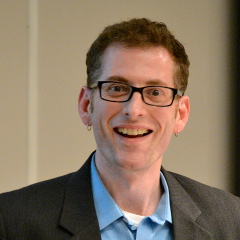
Donald Opitz Associate Professor School for New Learning DePaul University 2013-2014 Research Fellow
For this fellowship I proposed to visit three PACHS affiliated libraries containing records relevant to the establishment and early years of the Pennsylvania School of Horticulture for Women (PSHW), founded by Jane Bowne Haines in 1910. The libraries that I used included the Rare Book and Manuscript Library of the University of Pennsylvania (UPenn), the Library and Archive of the Academy of Natural Sciences (ANS) of Drexel University, and the Historical Society of Pennsylvania (HSP). In addition, I also used manuscript collections at the American Philosophical Society (APS), the Pennsylvania Horticultural Society (PHS), Temple University, and Wyck Historic House, Garden and Farm. Prior to my arrival, I was able to determine that my three proposed sites held significant collections critical to my study, but I could not know the full extent of the holdings at those sites and elsewhere until I dug into the collections and discussed my project more fully with the archivists. I quickly learned of uncatalogued collections at Temple University and the Pennsylvania Horticultural Society that contained extensive records as well as rare publications on several of the key persons involved in promoting American women’s collegiate horticultural education and advancement in related professions. I also learned of papers of the Haines family at Wyck and APS, which include records concerning Jane Bowne Haines’s involvement in the founding of PSHW. Through stimulating conversations about the subject with Lynn Farrington at UPenn, Janet Evans at PHS, Holly Beth Wilson and Jenny Rose Carey at Temple, and Addie Quinn at Wyck, the scope of my project expanded significantly. Not only was I dipping into records concerning PSHW, but I was also consulting member lists, minute books, and files of activities of various civic and academic societies relevant to the work of PSHW, especially the Philadelphia Society for Promoting Agriculture (UPenn), the Garden Club of Philadelphia (HSP), the Woman’s Land Army (HSP), and the Botanical Society of Pennsylvania (ANS). Given Haines’s membership in the Society of Friends, the Quaker context of women’s higher education has come to dominate my thinking about this subject. As a result I have given greater consideration to Pennsylvanian Quaker history, for which a good collection of books is available at Temple’s Special Collections Research Center. Various rare printed materials came to my attention, including a privately-printed history of Wyck House, a university-printed commemoration of the 100th anniversary of PSHW, society-printed histories like Boyd’s history of the PHS, and a UPenn Master’s thesis about the Ambler campus of Temple University, the former site of PSHW. At each of my research sites, then, not only did I utilize archived collections, but I also used closed and open stack holdings of pamphlets, books, and journals. During the month I spent in Philadelphia, I consulted a total of seven archives, visited the college site at Ambler (where various commemorative plaques and exhibits are on display), typed up over 100 pages of notes, and took over 300 photographs of documents, portraits, and memorabilia. From the information I have acquired, I am now able to trace the connections I sought between the founding of the PSHW and its forerunner European schools, as well as situate the founding of PSHW within the broader American context of promoting women’s training in horticultural science. Because I attended the History of Science Society meeting in Boston during my fellowship month, I was able to incorporate some preliminary remarks on this project into a presentation I gave on women lecturers in horticultural science. I received helpful questions and advice for my further work on this topic from my session’s attendees. Although my long-term publication plans for this work is a book-length study, I plan to produce an article focusing on Jane Bowne Haines and her role in establishing the Pennsylvania School. There is further research I hope to do with collections at Bryn Mawr, Haverford, and Schlesinger concerning the Woman’s National Farm and Garden Association and Jane Bowne Haines. The research fellowship from PACHS was invaluable in advancing my project to a stage where I can now draft the article and sections of the book dealing with the American side of this cross-Atlantic subject.